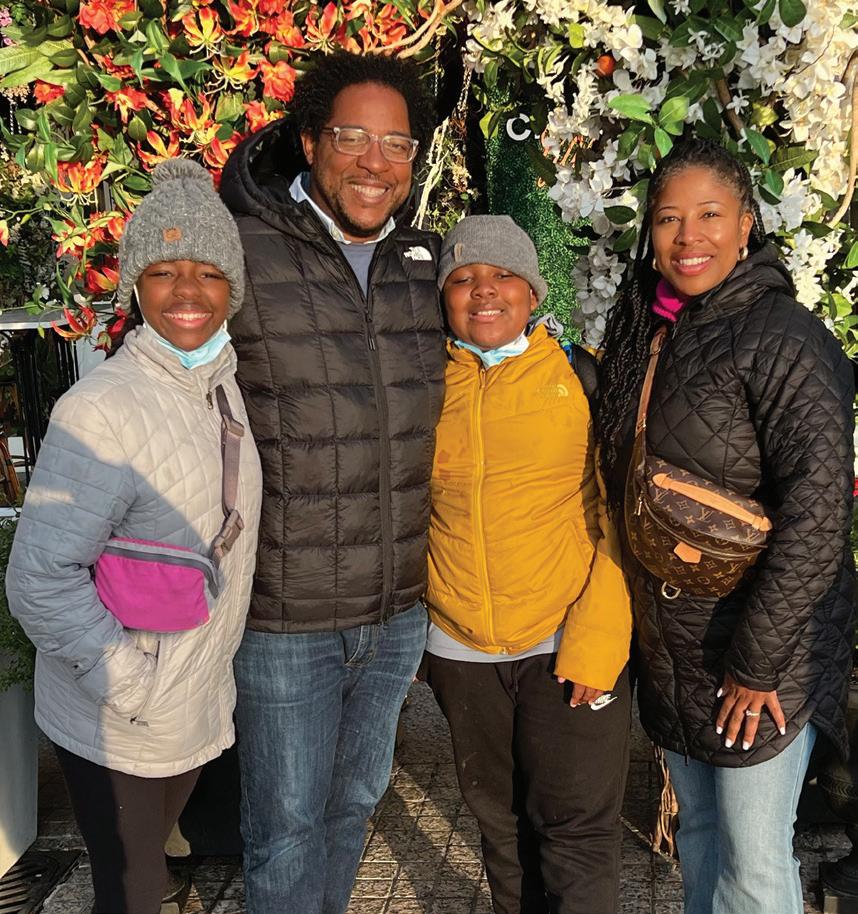
4 minute read
Jeannine Blanco ’89 Giving back
Tell us about your career path and the non-profit work you are involved in. I moved into the insurance industry out of college and held various positions in management, as well as in multicultural business development and public affairs in New York City. Also, I have a consulting business focused on assisting non-profits with their fundraising needs, including event management and execution.
My passion is my consulting business in which I focus on managing fundraising events for non-profits. One of my favorite events to manage is Party on the Green which is one of the largest fundraisers for the East Lake Foundation. Typically, over 400 people attend this event in Atlanta at the East Lake Golf Club each year. As part of my responsibilities, I must lead their fundraising efforts as well as implement event plans and concepts, negotiating vendors and handling the overall logistics of the event. To date, I have assisted in raising over $2 million dollars for this organization. The proceeds for this particular fundraiser support childhood education in the East Lake community.
Also, I am involved with the East Lake Women’s Alliance where I manage a group of women who focus on golf, networking and community service. It has been very fulfilling for me to connect with this diverse group of women and continue to give back to the community.
What do you value most about your education at the Academies?
I enjoyed being educated in a small, intimate environment in which my classmates were able to form a lifetime bond with each other. If I call or message anyone in my class, we are able to pick up where we left off, even if it’s been years since we were last in touch! Also, our teachers appeared to really care about our education.
What advice do you have for current and future students?
It is important to take advantage of all the opportunities that you have at the Academies. Also, make sure to stay connected to the school. The Academies are a special place and you would be surprised how many alumni/ae there are all over the country. I have formed relationships even with recent graduates and it is always a positive experience.
What do you like to do for fun?
I enjoy spending time with my family. My 13- year-old daughter and 11-year-old son both keep me busy with their activities. Also, I enjoy traveling, dancing, reading, and staying healthy. It is my goal to enjoy life and live it to its fullest!
Dr. Rufus Burlingame ’70 Good science takes time
Perseverance was the most important trait for Rufus’ two professional careers, one in academics and one in the biotech industry. From working as a technician in a biochemistry laboratory in Boston he learned that he wanted to be in charge of a lab, and the only way to do that was to get a Ph.D. Good transcripts and references paved the way for him to be accepted into the graduate biology program at Johns Hopkins University. Once there, the hard part was learning enough about a particular field to know what questions were unanswered, and then performing the experiments to elucidate the answer to one of them. That takes hard work, skill, luck, and perseverance. “Controlling gene expression, i.e., how skin, liver, muscle cells, etc. express different proteins even thought they all have the same DNA, was and still is an active area of research. In humans, and all eukaryotes, DNA is wrapped around an octamer of proteins called histones, to form a structure called a nucleosome. Nucleosomes and the DNA linking to the next nucleosome organize the DNA so that it looks like a string of pearls. It is thought that to keep the DNA silent it stays compacted, and to express a gene the DNA opens up. A basic tenet of molecular biology is that the structure of a molecule can tell us about its function”, said Rufus. Using x-ray crystallography he determined the structure of the histone octamer, hopefully giving insight into how the DNA is controlled.
Once he had his Ph.D. in hand, getting a post-doctoral position (or 2 or 3) turned out to be straightforward. Rufus actually changed fields from biophysics to immunology, studying the antibody markers that are found in autoimmune diseases. He was an expert in the biochemistry of histones and nucleosomes and used that expertise to make new substrates for studying autoantibodies. It turned out that antibodies against the nucleosome was an excellent marker for people with Systemic Lupus Erythematosus.
The most difficult part came next, getting to oversee my his lab. The two options were to apply to universities and write grants to NIH and NSF or to apply to biotech companies in my field of immunology. After a couple years of unsuccessfully applying for academic and industrial jobs, he found a company that specialized in manufacturing kits to help diagnose autoimmune diseases. Their business model was to be the first company in the world to get FDA approval for a new clinically useful autoantibody marker.
“I was a perfect fit at that company. My first project was to commercialize the anti-nucleosome antibody assay that I had discovered while in academia. The perseverance to find the right job paid off, as I worked there happily and productively for 15 years”, said Rufus.
Just about everyone in my class at The Albany Academy has had a successful career. We feel the lessons we learned and the experiences we had while at the Academy helped us persevere in pursuing life’s challenges. When we learned that the Academy could use a permanent pavilion for outdoor gatherings, it was an honor that our class could get together to donate the funds for that structure.











